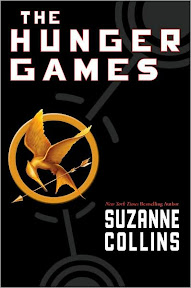 Reviewed by Steven Wolk.
Reviewed by Steven Wolk.I have never watched a "reality show." Supernanny, Survivor, Big Brother, Wife Swap, and on and on and on, I’ve never seen one of them. Sure, I’ve caught ten seconds here and there as I flipped channels, but I’ve never parked myself on a couch and flipped one on. The fact is, I don’t watch much TV, but reality shows take my disdain significantly further. I just don’t like the idea of the shows. And besides, there isn't much "reality" in reality TV, but a manufactured reality. They are, after all, a TV show. Enter The Hunger Games, a dystopian novel (with a dash of sci-fi fantasy) about reality TV – and society – gone amok. I may not like the shows, but I had to read this book. And once you start reading it you will zip through it like the story’s tracker jacker bees, honing in hungrily on a victim. This is a dazzling book that should be devoured by middle and high school kids and adults.
It is the future. The United States is no longer and in its place is Panem, which is divided into twelve districts. Each district focuses on a commodity. While one district does the agriculture another does the coal mining. There is a clear hierarchy to the districts; a class system. Food is scarce; some people choose (illegally) to hunt for food. Rulers in the Capitol, a wealthy and somewhat mysterious epicenter of power, run Panem. Clearly they have a very good life while the people struggle. Each year the rulers host a reality show – The Hunger Games -- that pit people from each district against each other. One boy and one girl – 24 in all -- are selected in a lottery to compete. But there’s a catch. There’s only one winner because in the end, there is only one still alive. That’s right, Jerry Springer is a walk in the park compared to the Hunger Games, where kids from twelve to seventeen fight to the death in a chosen arena – and it’s all a wildly popular TV show. The Hunger Games is, almost needlessly to say, the first book in a trilogy.
Sixteen year-old Katniss lives in District 12, the land of near-destitute coal mining, and immediately volunteers to replace her younger sister in the Hunger Games after she’s selected in the lottery. Katniss has at least one advantage: The arena for this year’s games takes place in a forest, and Kat has become something of an expert hunter to keep her family fed. That’s right, Katniss is a hunter, but now she will have to hunt people – no. make that children – to stay alive. So, right about now you might be thinking how disturbing this sounds. Well, it’s meant to be disturbing.
Out there, roaming the forest, in fear of imminent attack, Katniss is a jumble of emotions and intellect. She is not only a hunter, but she is smart. And she is weighed down by the complex emotions over two boys, Gale, her hunting partner back home, and Peeta, the other District 12 participant in the games she became close to during their pre-games training. Kat knows – and we know – that for her to win Peeta must die. And constantly hovering over her like an ominous cloud that never leaves are the Gamemakers in the Capital, because they are controlling much of what happens in the arena during the games, just like they are using their power -- and entertainment – to control the people of Panem.
Like all great dystopian novels, The Hunger Games may take place in the future, but the story is really about life today. Sure, we’re not watching people slaughter each other on TV, but our nation loves to watch men pound each other in the boxing ring and pay-per-view "Ultimate Fighting" and tune into Maury to witness people scream at each other about a pregnant fifteen year-old, not to mention the endless TV shows and movies focused on pretend violence and our very real wars with their very real violence. So, yes, the book is disturbing and tense and sometimes graphic. But maybe our lives are not all that far from the Hunger Games?

1 comment :
Just wanted to let you know that I've linked to your great review here: Random Wonder
Post a Comment